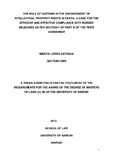| dc.description.abstract | The Kenya Revenue Authority (KRA) customs services department acknowledges
that its primary function is to collect and account for import duty, VAT on imports and
to collect other taxes on an agency basis. KRA's non revenue generating functions
including the enforcement of Intellectual Property Rights (IPRs) in compliance with
international obligations outlined in TRIPs are not given priority which translates into
an increased risk of the proliferation of counterfeit goods in Kenya.
The problem is further compounded by the fact that KRA is underfunded and this has
an adverse effect on its operations as reflected in staff shortages, lack of adequate
training of staff and lack of procurement and maintenance of information
communication and telecommunications (ICT) systems which hampers the
enforcement of IPRs
This paper presents a study on the legislative and institutional framework governing
the enforcement of IPRs through customs in Kenya and how the legislative and
institutional framework can be reformed to enhance the current capacity of customs
which is resource constrained to efficiently and effectively enforce IPRs in Kenya in
compliance with the border measures outlined in TRIPs.
This study has identified a number of issues that need to be addressed as a way of
promoting the efficient and effective enforcement of IPRs through customs in Kenya
including the clear delineation of roles between customs officials and officials of the
Anti-counterfeit agency, legislative amendments to provide for a customs recordation
system, resource allocation within KRA, greater regional integration and
harmonization of Intellectual Property laws in the East African Community, ensuring
that the laws provides for indemnity and security requirements that are not
unreasonable and burdensome and clarifying the deminimis exception to avoid its
abuse | en |

